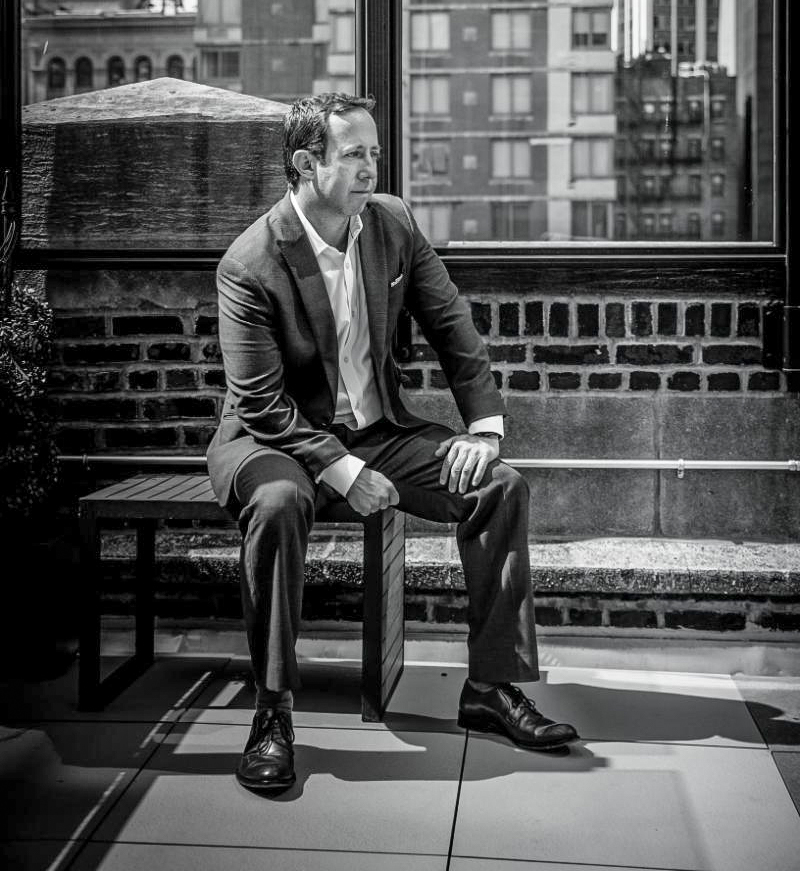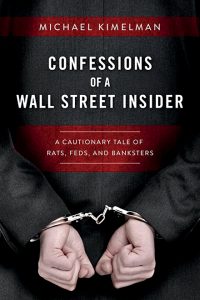Q&A
Your ties to Rajaratham were relatively thin. How did you get caught up in the web of prosecutions?
Prosecutors went after Raj and then saw that my business partner, Zvi Goffer, had worked for him directly. Goffer was clearly someone who was breaking the law and getting information. He wasn’t the same caliber as Raj. Raj would get calls from a Goldman Sachs board member after Warren Buffet decided to give Goldman a $5 billion hard money loan. That’s insider trading, the kind they teach you in law school and everywhere else. My partner was trying to do things that were clearly part of a conspiracy and then casting that information onto other people as if it was his research.
There’s a difference between getting a call from a Goldman Sachs board member who is saying, “GS’ (stock) is going to go up,” and me, five or six traders down the line, getting a call from someone saying, “I’m hearing good things on this stock; Raj and a bunch of the traders at the fund are getting long.”
The entire focus and scope of the insider trading investigation by former U.S. Attorney Preet Bharara was, in my opinion, a deliberate effort to take the public’s eye off the ball and pacify the American public who were hurt and furious about the financial crisis, and justifiably so. Instead of going after the real actors and actions that caused and contributed to the financial crisis (mortgage fraud, bad public policies, etc.), Bharara chose to go for the easy money and easy headlines in insider trading. This was a very simple and convenient narrative that he and the Obama administration were able to sell to an angry public to show they were doing something about the crisis. It was an easier approach than conducting a proper investigation into what caused the financial crisis, which might have yielded some real targets and real reform.
You were offered a deal to plead guilty to a charge of participation in the conspiracy and receive no prison time. Why didn’t you take it?
Because I didn’t break the law. And I wasn’t going to get up in front of a judge and perjure myself and say I knew. Don’t get me wrong, plenty of people do that in our system including several in our specific case. One defendant pled guilty saying he “now knows” that information he obtained about 3Com getting acquired was insider information. Well guess what? That’s not the standard. It’s when you made the trade—not after the fact when the FBI shows you a tape two years later and a chain of how the “tipper” illegally obtained the information.
I knew there were potential consequences for standing up and fighting for what I believed in, and I was prepared to pay those consequences. In the end, I knew I would have to look myself and my children in the eye and be at peace with my decision. Granted, I had an idea that I would be facing somewhere in the one- to three-year range. If I was facing five or 10 years and they offered me that probation deal, I probably would’ve pled guilty to anything they wanted, including the Kennedy assassination. It was a calculated risk. I handicapped the odds terribly, but I assumed what I had been taught in law school was true, that the system is an adversarial, objective system where both sides present evidence before a neutral judge, and a fair and impartial jury of my peers makes a determination. The fact that the prosecution wins 97 percent of the time is de facto proof that our entire justice system is a myth. That statistical outcome would be impossible if the system was the idealistic system described above. Would you ever buy tickets to a sporting event where one side wins 97 percent of the time?
What evidence was presented against you at trial?
I was convicted based on one call the government didn’t even record. The jury was instructed to speculate that I “must have been told” about an inside source even though the Feds could not point to a single illicit trade or comment I had made after nearly two years of wiretaps, seven informants, thousands of instant messages, and emails. It’s particularly head-scratching especially when they had an FBI informant sitting next to me on the trading desk wearing a body wire for almost 18 months trying every day to implicate me. The fact that they didn’t even call him at trial should have been proof enough for a jury that this case didn’t make sense.
Even more mind blowing, the only witness we called for the defense at trial was the LEAD FBI CASE AGENT. My attorney asked her one question: “Can you show me one wiretap, one body wire, one phone call, one email or instant message where anyone passes Mike Kimelman inside information and he trades on it?”
After a few seconds, she reluctantly answered,
“No, I can’t.”
What was prison like?
It’s fascinating, because everyone from college lecture halls to current clients and Bumble dates want to know one thing really: What was prison like? Each person’s experience is specific, and I can only speak to mine, but the two words I use are “barbaric” and “monotonous.” There is a notable lack of humanity in nearly every aspect. Prisoners have no rights, no appeal, and inhabit the closest thing to modern-day slavery that you can imagine.
There is an underlying current of sadistic despair, and the food makes a high school cafeteria seem like a Michelin three-star restaurant. The only exception was chicken on the bone, which we got every Thursday and looked forward to more than Christmas.
Prison is about leveling everything, regulating everything, and wearing you down. What takes over, behind the barbed wire, is the mind-numbing monotony and depression—and all that time on your hands. It gives you an uncanny, unique ability to reflect on your poor life choices, with no real distractions except getting through the day in one piece. Some cold evenings, your internal monologue becomes the greatest punishment of all. That, and separation from the ones you love.
How did you survive prison?
In prison you’re presented with a very stark choice whether to prepare for your eventual exit or to fall into a mind-numbing routine. The hardest thing to do is fill your day and to fill it productively. Sitting in the prison library and reading week-old Wall Street Journals each day to see a series of headlines about banks and other bad actors paying multi-billion dollar fines (but no criminal indictments) every other week and U.S. Attorney Preet Bharara on the cover of Time magazine as the so-called Sheriff of Wall Street, I could either pull my hair out, scream, or write. I ended up doing all three.
In my situation, there was some significant added drama and danger. The Bureau of Prison, in its infinite wisdom, sentenced a pair of brothers (Zvi and Emanuel Goffer), who were my co-defendants, to the same institution as me. The older brother (Zvi) was the architect of the inside trading conspiracy. Of all of us, he deserved to go to prison. He was also a sociopath. He thought I was the one who had got him convicted. During the trial, my attorney pointed out that of the nine people in my case charged with insider trading, I was the only one who didn’t have a prepaid cellphone or had paid a cash bribe. In his mind, he thought this made him look more guilty.
It probably did, but 500 hours of incriminating tapes and seven cooperating witnesses who got up on the stand and said, “He passed me inside information or paid me cash bribes” is why he got convicted much more than me pointing out I wasn’t a member of this conspiracy. He ended up getting an outrageously long sentence (10 years), which was relatively extreme considering there were no victims, he didn’t make any money, and that many people end up doing much less time for rape and other violent crimes. Once he was incarcerated, he had no one to take it out on except me. We were in a minimum security prison and for the most part I didn’t feel like I was in danger or at risk except for these two brothers. After a brutal couple of months of being stalked, I befriended several well known Italian inmates, and I was also doing a lot of tutoring and had garnered a wide variety of friends of all races. One of them, a former Aryan Nation guy named “Irish,” 6 foot, 4 inches, covered in tattoos, said to the older brother, “This ends now.” After that, I felt more confident I wasn’t going to be jumped.
Why do you think Irish stood up for you?
I had previously been around and related to people from all walks of life. I’ve lunched with billionaires in New York, but I also have friends who grew up with nothing, gangbanging in South Central and are now social workers or drug counselors. People were afraid to interact with him because of his past, but I approached him straightforwardly and said, “I know you’ve been here a long time, and if you’re curious about what it’s like out there, I will answer your questions, and I want nothing in return.” He saw I was a respectful person. There are all types of rules and unwritten mores and codes of how you act inside, but at the top of the pyramid is respect. You have nothing inside; you’re living in a crowded 3-by-3 space wearing the same clothes and eating the same food as everyone else.
Respect is a very big thing. Every fight or issue in prison is over a lack of respect. If you’re humble and respectful, you’ll do OK, even if you’re in the minority and tagged as a “wealthy white collar guy” in a place dominated by blacks and Latinos. I don’t think I’m better than anyone else, and that’s noticeable. So after a month, he came back to me. He was smart and had matured enough to see race segregation in prison as nonsense. I also tutored inmates for the GED. Other inmates were interested in the financial market. I asked the prison administration if I could teach job skills or a course on the stock market, and they said not a chance. They like the inmates uneducated (“We like ’em dumb so they come back to us,” was said to me with a smile by various guards or members of the administration on more than one occasion), so I taught those classes underground.
Tell me about the day you were released from prison.
I was grinning ear to ear because I was met by my (then) wife and three children. For 15 months on the cramped bunk with bedding no thicker than a yoga mat, I had prayed. People in prison pray for lots of things. I prayed for only one, that my children would stay healthy and be in one piece when I walked out. My prayers were answered.
Then we went to the Bronx halfway house where I was sentenced to serve another six months. On the way, we made a brief stop at a local Wawa for the best bacon, egg, and cheese sandwich I’ve ever had.
How did you occupy your time in the halfway house?
In the Bronx I hit the ground running. Selling two shows for co-development, producing a documentary, editing the memoir you see, writing a sitcom, and starting a real estate investment business. Coming out I was under no illusions. I had spoken to enough people to know I wasn’t going to waste my time interviewing for “normal” firms. In our hyper-regulated and overly litigious society, a felony jacket is like a scarlet letter that substantially removes the ability to get employment, licenses, education, housing—any number of critical things that I once took for granted. I knew if I wanted to earn, it was going to be on my end so it was back to the grind and hustle of an entrepreneur.
What are you doing now?
On the creative front, I’m working on a second book and just recently finished writing a TV pilot. I’m also in the process of producing a documentary in the true crime space that’s scheduled for release later this summer.
On the business front, I’ve been doing some targeted real estate investing since I got out, mostly in the Southeast. I also started a crypto-currency advisory firm in late 2016, and that’s obviously been a very exciting space to be in for the last 18 months. I’ve also been doing a fair amount of coaching and speaking after the success of the book on overcoming adversity, and criminal justice/prison reform.
I’ve been writing and working with formerly incarcerated individuals and groups that are proponents for change like The Fortune Society and Just Leadership USA to affect common sense reform. The United States imprisons a greater percentage of its population than any other country by a massive multiple. (We are 5 percent of the world’s population, and our citizens make up over 2 percent of the world’s prison population.) There’s a reason they don’t allow cameras or observers in federal prison. If Americans really understood what went on there, I believe they would shut the system down and recraft it in its entirety. Just a tad of sanity would produce drastic results.
Prisons are a necessary evil in a society as large and diverse as ours, and it’s understandable that punishment is merited for violations of the law. Sadly, the punitive side is almost the complete focus, and in a system that barely distinguishes between violent crimes like murder and rape (which is why we originally built prisons in the first place) and nonviolent “crimes” like smoking weed or other consensual “crimes” between willing adults, you would think there would be some rehabilitative aspect.
It’s a vicious rinse cycle of failure by design that writes off large chunks of our populace and has a tremendous cost to us as a society. We have a 66 percent recidivism rate here (two out of every three people who go to prison will return to prison within five years). It costs our society $80 billion a year just to warehouse these inmates and that doesn’t include the financial, moral, or spiritual cost of the lost productivity, the families who are decimated by Draconian sentences, or the suffering of the victims.
We’re probably talking well over a trillion dollars a year, and just the slightest bit of rehabilitation could dramatically alter these numbers. While I was away, there were virtually no rehab programs, job skills training, or educational options. Computing power and online education via Coursera or Khan Academy is virtually free these days. Why not offer options where inmates could productively use their time to gain skills or knowledge that would allow them to maximize their chances of gaining employment upon release and not reverting back to a lifestyle that incarcerated them in the first place?
How did prison change you?
It’s a horrible experience, but if you use it as a lesson and an opportunity to rediscover and appreciate what you have, it gives you a higher caliber and quality of life for your remaining days. Once you’ve seen how low the valley can be, you realize what’s important in life.
Prison is about leveling everything, regulating everything, and wearing you down. What takes over, behind the barbed wire, is the mind-numbing monotony and depression—and all that time on your hands. It gives you an uncanny, unique ability to reflect on your poor life choices, with no real distractions except getting through the day in one piece.
The silver lining of prison, other than the radical readjustment of perspective and gratitude, is I met people that I likely would never have encountered and remain friends with many of those who went through the fire with me. People like Kareem “Biggs” Burke, who just launched the incredible Roc96 clothing line, or Clayton Kellum, who opened a series of revolutionary fitness gyms in the Northeast. There are a dozen or so others, and I’m blessed to call them my friends.
Life goes on, and it’s not what happens that defines us, but how we react to it and the mindset we choose. So that’s how you can go from an eight-figure net worth to semi-homeless crashing on a friend’s couch and still be smiling. After all, my kids are smiling too, and I can eat chicken on the bone whenever I want.
What’s your relationship with your kids these days?
If anything, my relationship with my children is stronger. Once you’ve had everything taken from you, and you don’t get to see your children for months if not years, you understand how incredibly lucky you are to have healthy children and to be able to play a meaningful role in their lives. It’s also a bit clichéd, but you don’t sweat the little things.
As I mention in the book, while I was away, my kids hadn’t seen me in quite some time so my parents flew 3,000 miles from California to New York to pick them up and drive four hours to Lewisburg to visit me. While they were waiting in the visiting room, the administration decided to cancel all visits for the weekend because some inmate got caught smoking. From my vantage point, I could see my 3-year-old and 6-year-old sobbing hysterically as they were escorted back to their car. Once you’ve gone through that, and other episodes that rival it, you don’t get caught up in the minor stuff. So yeah, if they want to eat pancakes with their hands or stay up past their bedtime to watch the Lakers game with me, so be it.


